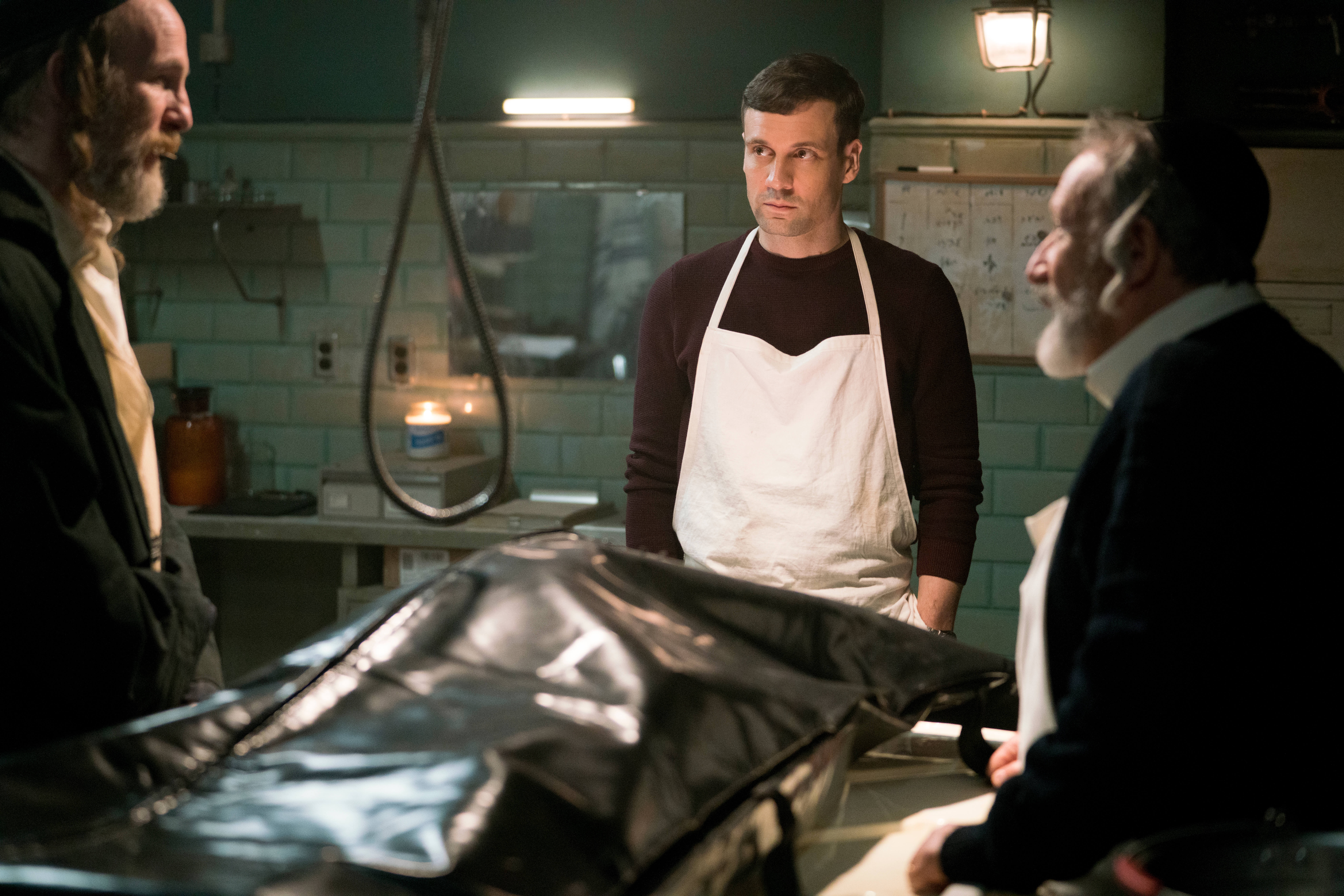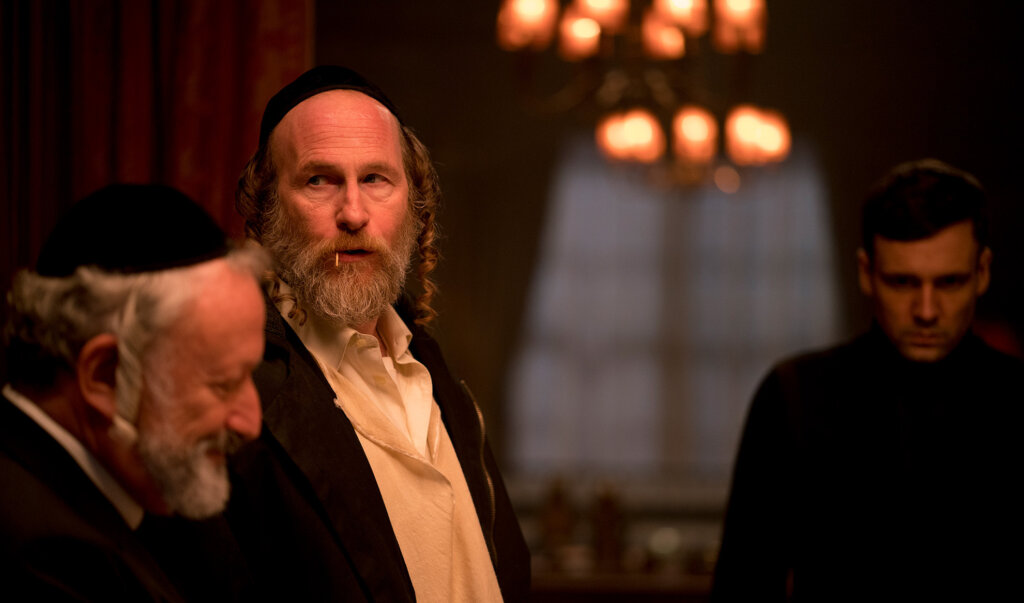Do horror and Hasidim mix? A new film says yes
‘The Offering’ aims to introduce audiences to authentic Jewish characters — and scare them along the way

Graphic by Angelie Zaslavsky
One night seven years ago, movie producers Hank Hoffman and Jonathan Yunger spent a sleepless night creating a monster.
It wasn’t Hoffman’s first time pulling an all-nighter — he used to work the spookiest shift in Judaism as a shomer, or guardian, at a Jewish morgue in Toronto.
“I used to hang out with the corpses when I was 18 from midnight to 6 in the morning by myself,” Hoffman said.
A morgue is a central setting for Hoffman and Yunger’s new horror film The Offering, about a Hasidic funeral director in Borough Park, Brooklyn, who’s haunted by a demon called Abyzou.
The film, which opens in the U.S. and on streaming services Jan. 13, was made to be more than just a horror movie. Hoffman and Yunger wanted to accurately depict Hasidic life and, wherever possible, counter what they view as negative narratives about the community presented by other films and TV shows.
“With what’s out there today, it’s been misconstrued and unfortunately these types of shows don’t have any disclaimers or anything on the front of them,” said Yunger, co-president of Millennium Media, which produces The Expendables action franchise. ”We wanted to show people that there is a depth here and there is a respect and there is holiness in the women and there’s holiness in the men.”
Director Oliver Park, an English filmmaker who isn’t Jewish, brought Yunger and Hoffman’s script to life in Sofia, Bulgaria, during the peak of the COVID pandemic. The cast and crew formed a sort of coronavirus eruv, recreating Borough Park on Millennium’s backlot and peopling it with local Bulgarians dressed like frum Jews. Shows like Unorthodox have proved sets are no substitute for shooting exteriors on location, but that show helped create The Offering’s illusion of authenticity.
“We rented the payos from Unorthodox,” said Yunger. “They shipped it. It was the funniest package I’ve ever gotten in my life.”
On soundstages, production designer Phil Murphy and Park, who trained as an architect before directing the horror shorts Still and Vicious, constructed an attic strewn with melting candles and actual kabbalistic text. As Abyzou ramps up its attacks, the set itself begins to founder.
Central to The Offering’s story are three men: Yosille (Anton Trendafilov), who summons Abyzou while trying to resurrect his beloved wife; undertaker Saul (Allan Corduner) another widower; and Arthur (Nick Blood), Saul’s off-the-derech son who married outside the faith and is desperate to provide for his growing family. Hoffman and Yunger designed these plots to challenge the perception, which they say is common in media, that Hasidic men disrespect their wives.

Corduner, whose first feature film credit was as yeshiva student Shimmele in 1983’s Yentl, and last year appeared as Lydia Tár’s spurned assistant conductor in Tár, has a long career of playing observant Jews — notably alongside Al Pacino’s Shylock in Michael Radford’s film of Merchant of Venice.
He didn’t need much coaching for a pivotal scene, where Saul sings “Aishet Chayil,” a tribute to the Jewish woman from the Book of Proverbs, to his departed wife. Corduner was drawn to what he called the “ritualistic Kabbalah gone berserk” in the script and the interfaith marriage at its center.
“One can relate very strongly to a man who had shut out his child — only to find that it was the mistake that haunted him,” said Corduner.
Cloaking these philosophical concerns are, of course, scares, for which Park drew inspiration from the German Expressionist film The Golem: How He Came Into the World, Caravaggio’s “Sacrifice of Isaac,” the Silent Hill video game series and his own nightmares.
“This is not my culture,” Park admitted, “although I would say my culture is horror. That’s one thing I can bring to the table in spades, I know how to scare people.”
To make sure the scares were rooted in credible mysticism, the dialect coach Michael Andron looked to the Talmud to find a spell.
“We just kind of twisted it and turned it so that we weren’t summoning any demons onto the set,” said Andron, who met Yunger while directing him in a Jewish theater company.
The Offering, which boasts an international cast, including Paul Kaye (Thoros of Myr on Game of Thrones) as a tooth-picking chewing mortician named Heimish, places a premium on storytelling and scares. Certain inaccuracies (a character wearing tefillin on the first day of a shiva, for instance) may leap out to a Jewish viewer. The film also has a similar conceit and the same Borough Park setting as 2019’s The Vigil, which featured a wealth of Yiddish dialogue and an actual Hasidic actor in Menashe Lustig.
But Hoffman, who grew up Modern Orthodox and used to teach Likutei Moharan, a central text of the Breslov Hasidic movement in Safed, said the crew was committed to authenticity. While Saul’s sect is intentionally left vague, Hoffman said there are “winks” to Breslov throughout, even in the form of street graffiti.
It was important for the filmmakers to capture an overall feel of the Hasidic community in an effort to humanize Hasidim for the world. But Hoffman and Yunger, while concerned with antisemitism, were also intrigued by what a Jewish horror movie might look like.
“The notion of evil in Christianity versus the notion of evil and Judaism is uniquely different, which allows you to have uniquely different horror tales,” said Hoffman, noting how Christian exorcism stories often give evil its own autonomy. The Jewish view, Hoffman said, stresses freedom of choice, in which evil arises when we substitute God’s will for our own.
“Only we determine how much good and evil enter the world,” Hoffman said. “If we don’t stay within our own moral circle and we step outside of it, then we invite it in. And evil you need to feed it to sustain it. If we stop feeding evil, it ceases to exist. We are the ones actually nourishing it and so that thematic idea is really the underlying Jewish ethos.”
For Yunger, the film is not just about the promise of Jewish horror — it’s also a challenge.
“The Offering is going to come out,” Yunger said. “What other young filmmaker is going to come out and try to top this thing?”

















